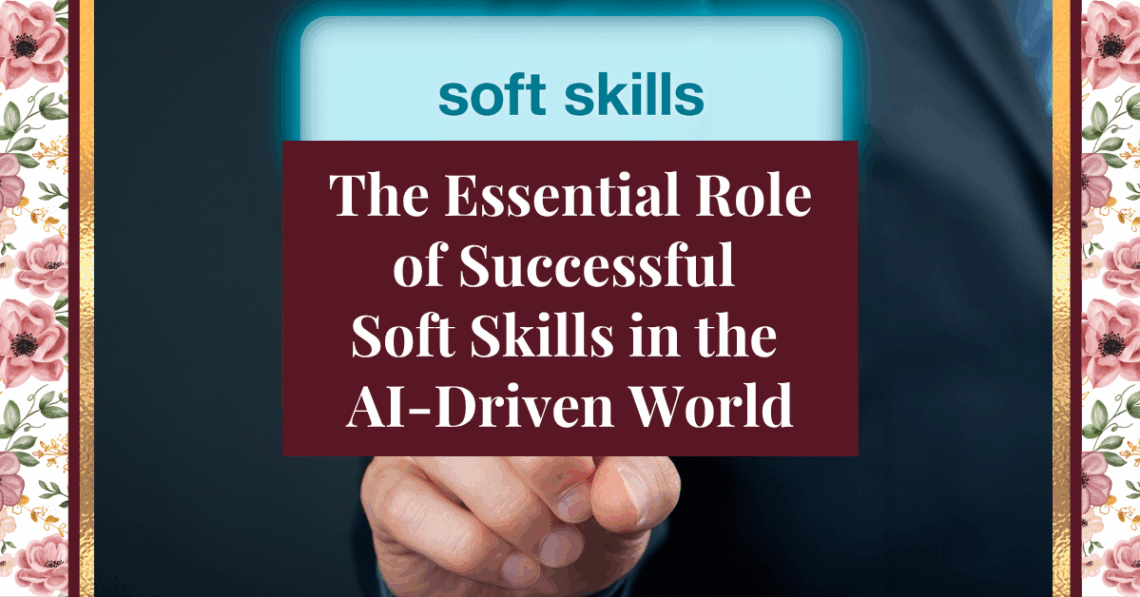In a world where artificial intelligence (AI) is rapidly transforming industries, workflows, and even how we communicate, there’s a growing concern about how humans fit into the picture. Machines can now analyze massive data sets, recognize faces, translate languages, and even write basic articles. But there’s one thing they still can’t replicate: the depth and complexity of human soft skills.
As technology advances, the demand for soft skills is not fading—it’s increasing. In fact, soft skills may be the very thing that ensures human workers remain irreplaceable.
So, what are soft skills? Why are they so vital in this AI-driven world? And how can we grow in them intentionally? Let’s explore these questions and look at how soft skills shape the future of work, relationships, and purpose.
What Are Soft Skills?
Soft skills are the personal attributes that allow someone to interact effectively and harmoniously with others. They’re not technical abilities or hard skills that can be measured with a test. Instead, soft skills are often intangible, personality-driven, and developed over time.
Some core soft skills include:
- Communication
- Emotional intelligence
- Problem-solving
- Adaptability
- Leadership
- Critical thinking
- Teamwork
- Time management
- Conflict resolution
- Creativity
These aren’t just “nice to have” skills—they’re essential in both professional and personal settings. And they’re becoming more valuable than ever.
The Rise of AI and Automation
The AI revolution has led to the automation of many routine and repetitive tasks. Machines are now performing work once done by humans in fields like manufacturing, customer service, finance, and even healthcare.
AI excels at:
- Speed and accuracy in calculations
- Processing large data sets
- Predicting patterns based on data
- Repetitive or rules-based decision-making
While this improves efficiency, it also means that many job roles will evolve—or even disappear. But this doesn’t mean humans are being replaced. Rather, the nature of work is changing.
Why Soft Skills Matter More Than Ever
AI can crunch numbers, but it can’t show empathy. It can suggest a solution, but it can’t comfort a client going through a crisis. It can schedule meetings, but it can’t navigate a heated team conflict with grace and discernment.
Soft skills are uniquely human, and in an AI-saturated world, they set us apart.
Here’s why they’re so essential:
1. Emotional Intelligence Can’t Be Automated
Emotional intelligence—the ability to recognize, understand, and manage emotions—is at the heart of good leadership and teamwork. Machines can interpret tone or facial expressions to some extent, but they lack true empathy.
In careers like counseling, teaching, nursing, and ministry, emotional intelligence is vital. Even in fields like law, marketing, and tech, navigating human relationships is crucial. Empathy builds trust and collaboration—two things AI can’t fake.
2. Creative Thinking Fuels Innovation
AI can remix existing content and suggest ideas based on trends, but true creativity and original thinking come from humans. Problem-solving in unpredictable, nuanced situations requires human intuition.
Creativity isn’t limited to artists. It’s essential in designing new products, writing meaningful content, launching campaigns, and inventing new business models. Soft skills like curiosity, imagination, and critical thinking drive the innovation that machines can’t generate on their own.
3. Leadership Requires Human Presence
AI can help leaders by analyzing performance data or organizing schedules, but it can’t lead people. Leadership involves vision, values, character, and trust-building. Whether leading a classroom, a church, a startup, or a global team, soft skills are what make a leader influential.
Leaders must communicate effectively, inspire others, and navigate conflict with integrity. These are soft skills rooted in wisdom, discernment, and experience.
4. The Human Touch in Relationships
In customer service, mentorship, ministry, or counseling, the human touch makes all the difference. A chatbot can answer basic questions, but it can’t offer comfort in grief or pray with someone after a loss.
As believers, we’re called to reflect Christ in how we love, serve, and communicate. Our spiritual calling depends on soft skills—especially compassion, listening, and humility.
Real-World Applications of Soft Skills in an AI-Driven Workforce
Many top companies are already prioritizing soft skills in hiring and training. Google’s Project Oxygen revealed that the top traits of successful employees were soft skills—not technical ability.
Here’s how soft skills show up in real-world environments:
- Education: Teachers must adapt to AI tools in classrooms while continuing to lead with empathy and manage student relationships.
- Healthcare: Nurses and doctors use AI-assisted diagnoses but still need soft skills to offer hope, build trust, and deliver bad news with compassion.
- Business: Managers use AI to monitor performance, but team motivation, workplace culture, and ethical decision-making all depend on human insight.
- Ministry: Technology can help share the Gospel globally, but making disciples still requires connection, patience, and listening.

Bridging the Soft Skills Gap: How to Teach the Missing Basics to Today’s Young Talent
The number one challenge with today’s young talent is a problem hiding in plain sight: the ever-widening soft skills gap. Today’s new, young workforce has so much to offer—new technical skills, new ideas, new perspective, new energy. Yet too many of them are held back because of their weak soft skills.
Based on more than twenty years of research, Bruce Tulgan, renowned expert on the millennial workforce, offers concrete solutions to help managers teach the missing basics of professionalism, critical thinking, and followership—complete with ninety-two step-by-step lesson plans designed to be highly flexible and easy to use.
Tulgan’s research and proven approach has show that the key to teaching young people the missing soft skills lies in breaking down critical soft skills into their component parts, concentrating on one small component at a time, with the help of a teaching-style manager.
How to Grow in Soft Skills
Unlike hard skills, which are often learned through courses or certifications, soft skills are developed through reflection, experience, and intentional practice.
Here are a few ways to grow:
1. Practice Active Listening
So much of communication is listening, not talking. Pay attention to others’ words, tone, and emotions. Resist the urge to jump in with your opinion. Ask follow-up questions that show care and curiosity.
2. Seek Feedback Regularly
Ask trusted mentors, colleagues, or friends to share how you come across. Are you approachable? Clear? Kind under pressure? Honest feedback reveals blind spots and areas for growth.
3. Step Into Leadership Roles
Volunteer to lead projects, small groups, or events. These experiences develop communication, decision-making, and conflict-resolution skills.
4. Practice Self-Awareness
Soft skills start with knowing yourself. Reflect on your values, strengths, and struggles. Journaling or Bible study can help you recognize patterns and grow in wisdom.
5. Study Jesus’ Example
Jesus showed the perfect balance of truth and grace. He listened deeply, responded wisely, and led with compassion. Studying His interactions can help you grow in humility, empathy, and integrity.
The Kingdom Perspective
As believers, soft skills are more than just workplace essentials—they’re also spiritual fruit.
- Communication reflects our call to speak the truth in love (Ephesians 4:15).
- Empathy mirrors God’s compassion (Psalm 103:13).
- Patience and gentleness are fruits of the Spirit (Galatians 5:22–23).
- Integrity points people to Jesus (Matthew 5:16).
In a world shaped by data and algorithms, soft skills are how we show God’s image to others.
Preparing the Next Generation
If you’re a teacher, parent, or leader, now is the time to start cultivating soft skills in the next generation. Here are a few tips:
- Teach your students how to resolve conflict respectfully.
- Encourage your children to make eye contact, say thank you, and listen without interrupting.
- Model humility and vulnerability in leadership.
- Share stories of people who’ve made a difference through compassion or perseverance—not just intelligence.
The future belongs to those who can combine technical competence with character, creativity, and emotional wisdom.
Final Thoughts
In an AI-driven world, soft skills are no longer optional. They are the key to thriving in both work and life. While machines may be faster or more efficient, only humans can bring warmth, empathy, and meaningful connection into the workplace and beyond.
Whether you’re leading a team, teaching students, raising kids, or mentoring others, the soft skills you develop today are shaping a more human—and more Christlike—future.
Let’s Talk!
Are you seeing how soft skills are shaping the workplace, classrooms, or even your church? Have you noticed areas where AI falls short and human presence makes all the difference?
Let’s grow together.
Share your thoughts or questions in the comments below, or join the conversation on Instagram @faithandformulas. I’d love to hear how you’re equipping yourself or others with the essential soft skills that reflect God’s wisdom in today’s world.
👉 Question for you: What’s one soft skill you feel called to grow in this year?





